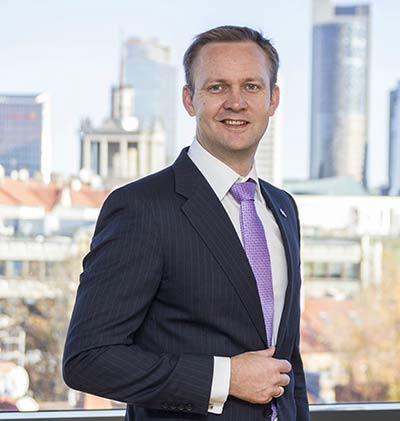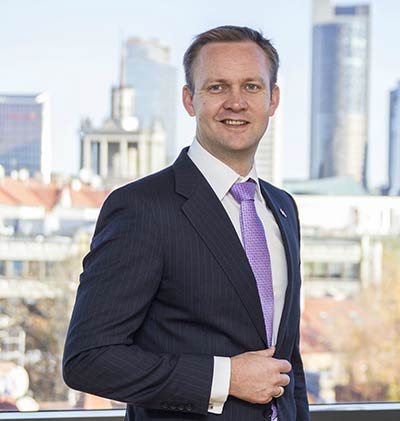
H.E. the Ambassador of the Republic of Lithuania to Greece Dr. Rolandas Kačinskas
The Secretary General of the Greek Section of the Association of European Journalists (AEJ) and Director of Research of KEDISA Dr. Panagiotis Sfaelos interviewed H.E. the Ambassador of the Republic of Lithuania to Greece Dr. Rolandas Kačinskas on the occasion of the co-organization (Embassy of the Republic of Lithuania in Greece and KEDISA) of the Internet Conference (webinar) on: “Geopolitics, Energy Security and Nuclear Energy Security”, which will take place on November 24, 2020.
-Your Excellency tell us why did you with KEDISA come up with the idea of holding such webinar?
It is clear that the growing global demand for electricity will also increase the demand for nuclear energy and, with it, the number of nuclear projects. Given its importance to the global economy and countries, even those which have nothing to do with the nuclear energy themselves, such as Greece, it is natural that it is necessary to raise awareness of the ongoing processes in nuclear energy field and, if they poses certain risks, to take appropriate measures to protect our interests.
So when I sat down with Dr. Andreas Banoutsos, Founder & President of the Center for International Strategic Analyses (KEDISA) to discuss the program, we came up with two most pressing issues, from our point of view: one relating to geopolitical and energy security aspects, and the other to nuclear safety and the environmental issues.
Of course, these issues are not new, but in the context of a fragmented international system, and as competition in the nuclear energy sector decreases, they become even more meaningful.
-Your Excellency you are talking about the falling competition, but the number of construction of nuclear power plants is on the rise, isn’t it?
Yes, but almost two thirds of all nuclear projects currently being implemented in the world are related to China and Russia, and in these countries the nuclear sector is being controled, as you know, by governments. The situation today is very different from the situation a few decades ago, when the global nuclear market was diverse and vibrant.
By the way, two nuclear projects are also being implemented in the neighbourhood of Greece: one in Turkey, just 80 km off the coast of Cyprus and the other in Egypt.
-Your Excellency who’s going to speak at the webinar and on what?
We managed to gather an impressive group of authoritative experts from Greece, the US, Poland, the EU, and Lithuania. Jane Nakano, a senior fellow at the Washington-based CSIS, for example, will present her findings from recently conducted study on the changing geopolitics of nuclear energy, while Hanna Smith, research director at the Helsinki based European Center of Excellence for Countering Hybrid Threats will discuss how nuclear power can become a hybrid weapon and what the EU’s response should be. KEDISA’s Analyst Themistoklis Zanidis will discuss the risks associated with the development of nuclear energy and nuclear proliferation.
At the next panel, President of the Institute of Energy for Southeast Europe (IENE) Constantinos Stambolis and Lithuanian vice- foreign minister Albinas Zananavičius will present their views from different European regions on whether the challenges posed by nuclear energy have been sufficiently assessed in the European Energy Security Strategy. And Kamil Klysinski, an expert at the Centre for Eastern Studies in Warsaw, will present one specific case on nuclear safety concerns.
Kostas Geropoulos, Energy and Russian Affairs Editor of New Europe newspaper will moderate the webinar.
– Your Excellency why is Lithuania interested in this topic?
Lithuania has always consistently raised energy security issues. Since the Belarusian nuclear power plant started to take off 25 km from the border with Lithuania, safety and environmental issues of nuclear energy have become increasingly important, although, in the case of the Belarusian NPP, the safety and geopolitical issues of nuclear energy are intertwined.
– Your Excellency what do you mean by that?
First of all, the Belarusian NPP carries a nuclear and environmental threat, as its construction has suffered from many problems, the project has been implemented by undermining the principles of good neighborly relations and violating the international Espoo and Aarhus Conventions, not taking into account recommendations made and questions asked during the European Union’s stress test process.
That this criticism is not superficial, shows the latest incident, which took place just three days after launching its first reactor – exploded the plant’s voltage transformers, which measure power in electrical circuits.
Previous incidents, of which at least 10 have emerged in public, also raise concerns: for example, a 330-tonne installation has fallen from 2-4 metres high as part of the installation of the Astravo NPP reactor hull. Initially, attempts were made to conceal the incident, but when it came to the public, the atomic authorities had to admit it, and the reactor body was decided to be replaced by another. But the analogue who replaced the battered corps of the reactor was also involved in an accident…
-Your Excellency where do you see the geopolitics in here?
Well, as our long-lasting experience in the fight for energy independence illustrates, energy projects and resources, whether they are nuclear or not, are often used as a political tool by some countries. As far as the Belarusian NPP is concerned, it must be noted that it is basically a Russian project, carried out by Russian energy giant “Rosatom” and financed by a Russian state loan.
This project has at least a few geopolitical subtexts.
One of them concerns Belarus itself. Contrary to what Lukashenko declares, i.e. that the Belarusian NPP is being built in order to reduce its dependence on “Gazprom” gas, in fact energy, and also financial and technological dependence on Russia, will only increase further.
But these are the Belarusian concerns.
What concerns us, Lithuanians, is that this may hinder our (and other two Baltic countries) efforts to synchronize its electricity system with Western Europe by 2025. Just think: regardless of the fact that Lithuania has been a member of the EU for 16 years now, its electricity system is still tied to Belarus and Russia through the so called BRELL Energy Ring, which is operated from Moscow. Without trade restrictions on electricity produced by the Belarus NPP to the Baltic States and Poland, plans for synchronization with Western Europe may be problematic in the future, as no one in other EU countries will want to allow electricity produced in a third country inside for economic and commercial reasons.
It should be remembered that Russia’s plans included – and still include – the construction of another nuclear power plant at the Lithuanian border. It had already begun to be built in the Kaliningrad area. If these plans resumes, Lithuania would found itself under nuclear tongs.
The revival of this project will depend in part on the EU’s response to the Belarussian NPP, the speed with which the Baltic States’ synchronization projects with the EU will move forward, and whether the EU can be persuaded not to buy unsafe and dirty nuclear energy from third countries.
-Your Excellency what is the EU’s position on the Belarusian NPP?
Let’s say this is an issue that increasingly finds its place on the EU agenda. The last example of this is the conclusions of the EU Foreign Affairs Council of 12 October, in which the Council called on Belarus to implement the highest international environmental and security standards and implement the EU stress test recommendations without delay.
It needs to be realized that the Belarusian NPP is not and must not be just a problem for Lithuania.
Lithuanians still remembers well that Lithuania, under pressure from the EU and the US, when joining the EU, had to shut down its own national Ignalina NPP, which at the time produced up to 70% of national energy needs.
Therefore, it’s only natural that we expect from the EU and other international partners and institutions the same principled approach and active action with respect to third countries.
Moreover, this issue also concerns the coherence and vitality a nuclear safety regime, i.e. coherence of international treaties, conventions and a certain standard of behaviour as well as accountability, and thus has a broader applicability and significance than that of the Belarusian NPP alone.
However, the Belarusian NPP has become a kind of litmus paper, showing how much the EU is prepared to do to ensure the enforcement of nuclear safety and environmental rules in the EU’s neighbourhood and elsewhere.
-Your Excellency what has been Greece’s position on this?
It should be said that Greece has demonstrated its understanding of the issue of nuclear safety raised by Lithuania, for which we are grateful and we expect the support of Athens to continue.
It is clear that the various nuclear challenges require joint efforts by countries and other stakeholders that go beyond geographical boundaries and beyond ideological differences in relation to nuclear energy. Therefore, it is irrelevant in this case that Lithuania and Greece are located in the opposite sides of Europe. Problems and challenges are of European nature. After all, Greece was also affected by radiation clouds emitted by the Chernobyl NPP, which exploded in 1986, and the consequences of which were felt for a long time to come.
In general, Lithuania sees many common points and interests with Greece, a country which seeks to become an energy hub in the Southeast Europe region and diversify its energy sources. We can also share our successful examples in this area. One is a liquefied natural gas terminal that became operational at the end of 2014, with the symbolic name “The Independence.” As a result of this project, Lithuania has reduced its 100% dependence on Russian “Gazprom” gas to a minimum.
Thank you for the conversation, and all the best with the webinar.


